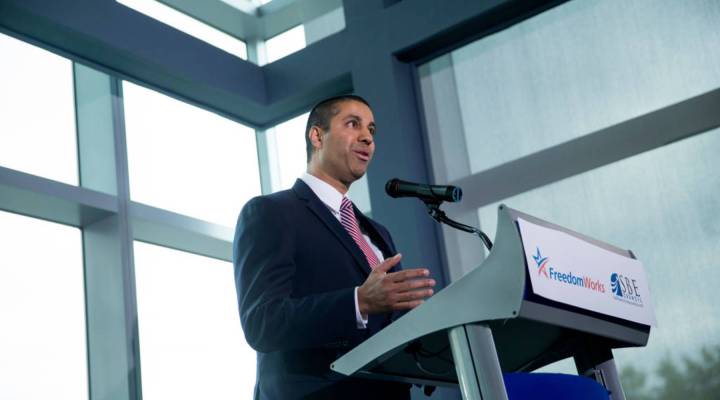
Why net neutrality rules are in danger

While a lot of attention today was on tax reform, Federal Communications Commission Chairman Ajit Pai was making news of his own. Pai outlined today what might be next for net neutrality, including a possible roll back of Obama-era regulations on internet service providers. Pai also said high-speed internet service shouldn’t be treated like a public utility.
Host Adriene Hill spoke with Marketplace’s senior tech correspondent Molly Wood to get some context on the latest news for net neutrality. Below is an edited transcript of their conversation.
Adriene Hill: I wonder if we can back up here for one second and just talk about net neutrality — remind us what we’re talking about.
Molly Wood: When we talk about net neutrality, we are talking about protections regulations that ensure that the providers of internet service cannot discriminate against any services. That they have to provide all services and treat all traffic on the internet equally. So it is often referred to as regulating the internet. What it really is is regulating the internet service providers.
Hill: So what did Chairman Pai announced today?
| Tim Wu on why undoing net neutrality may be harder than it looks |
| Outgoing FCC Chair Tom Wheeler on the future of telecom regulation |
Wood: He essentially kicked off his campaign to change net neutrality regulation, and he signaled that his approach is going to be really broad. He said that he will release a complete order to the public tomorrow and will have a long public comment period but that he intends to pursue a pretty dramatic change.
Hill: What are we expecting from his plan tomorrow?
Wood: Chairman Pai wants what he has referred to and what was referred to over and over in this press conference today — a very light regulatory framework. We suspect that what he wants to do is have ISPs voluntarily regulate themselves. So internet service providers would not be classified as utilities, which they are currently. And that there wouldn’t necessarily be specific restrictions in place about how much ISPs can charge, which is what they’re really about, worried about — rate changes. Or what kinds of traffic they maybe can allow to go through faster or slower.
Hill: Just stripping aside all the sort of inside-y tech stuff, what would this actually mean for me, sitting at home watching Netflix on my couch?
Wood: That unfortunately is the bulk of the entire argument. So those on Chairman Ajit Pai’s side say that what it would mean for you is greater innovation greater competition in the web space and that it would mean that telecom providers, like these big ISPs — AT&T, Comcast — that they would have more incentive to build out their infrastructure. That it would mean you’d be more likely to get fast access at home, or if you live in a rural area that they’d feel like “OK, look we have no restrictions on our ways to make money, so we have plenty of incentive to build our infrastructure.” On the other side, opponents of Pai’s plan and proponents of strong net neutrality regulations say that it would probably mean rate increases. That it could mean discrimination against certain kinds of traffic on certain networks, say Comcast, who owns NBCUniversal, might say “You have to subscribe to Comcast service and our TV service or else you can’t get Netflix.” That’s sort of the worst-case scenario on the other side.
Hill: So where does this debate go after tomorrow?
Wood: It will go to public comment, and then it will eventually go to a vote with the FCC. But there are hints that the ultimate goal is to basically take this whole issue and put it before Congress, because this is the third time that the FCC has taken up the question of net neutrality. It is highly contentious, it’s very partisan and politicized. In fact, I was very surprised at Chairman Pai’s tone in talking about this today and how dismissive he was of every other argument that’s come before. So a lot of people in the middle of this argument say what we actually need is a long-term relatively nonpartisan lasting legislative answer to this question so that it doesn’t keep pingponging back and forth between, you know, partisan FCC commissioners.
There’s a lot happening in the world. Through it all, Marketplace is here for you.
You rely on Marketplace to break down the world’s events and tell you how it affects you in a fact-based, approachable way. We rely on your financial support to keep making that possible.
Your donation today powers the independent journalism that you rely on. For just $5/month, you can help sustain Marketplace so we can keep reporting on the things that matter to you.












